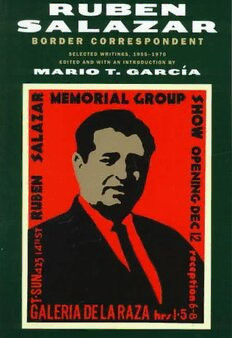
Border Correspondent: Selected Writings, 1955-1970 (Latinos in American Society & Culture) PDF
188 Pages·1998·0.53 MB·English
Most books are stored in the elastic cloud where traffic is expensive. For this reason, we have a limit on daily download.
Preview Border Correspondent: Selected Writings, 1955-1970 (Latinos in American Society & Culture)
Description:
This first major collection of former Los Angeles Times reporter and columnist Ruben Salazar's writings, is a testament to his pioneering role in the Mexican American community, in journalism, and in the evolution of race relations in the U.S. Taken together, the articles serve as a documentary history of the Chicano Movement of the 1960s and of the changing perspective of the nation as a whole.Since his tragic death while covering the massive Chicano antiwar moratorium in Los Angeles on August 29, 1970, Ruben Salazar has become a legend in the Chicano community. As a reporter and later as a columnist for the Los Angeles Times, Salazar was the first journalist of Mexican American background to cross over into the mainstream English-language press. He wrote extensively on the Mexican American community and served as a foreign correspondent in Latin America and Vietnam. This first major collection of Salazar's writing is a testament to his pioneering role in the Mexican American community, in journalism, and in the evolution of race relations in the United States. Taken together, the articles serve as a documentary history of the Chicano Movement of the 1960s and of the changing perspective of the nation as a whole.Border Correspondent presents selections from each period of Salazar's career. The stories and columns document a growing frustration with the Kennedy administration, a young C?sar Ch?vez beginning to organize farm workers, the Vietnam War, and conflict between police and community in East Los Angeles. One of the first to take investigative journalism into the streets and jails, Salazar's first-hand accounts of his experiences with drug users and police, ordinary people and criminals, make compelling reading.Mario Garc?a's introduction provides a biographical sketch of Salazar and situates him in the context of American journalism and Chicano history.
See more
The list of books you might like
Most books are stored in the elastic cloud where traffic is expensive. For this reason, we have a limit on daily download.
